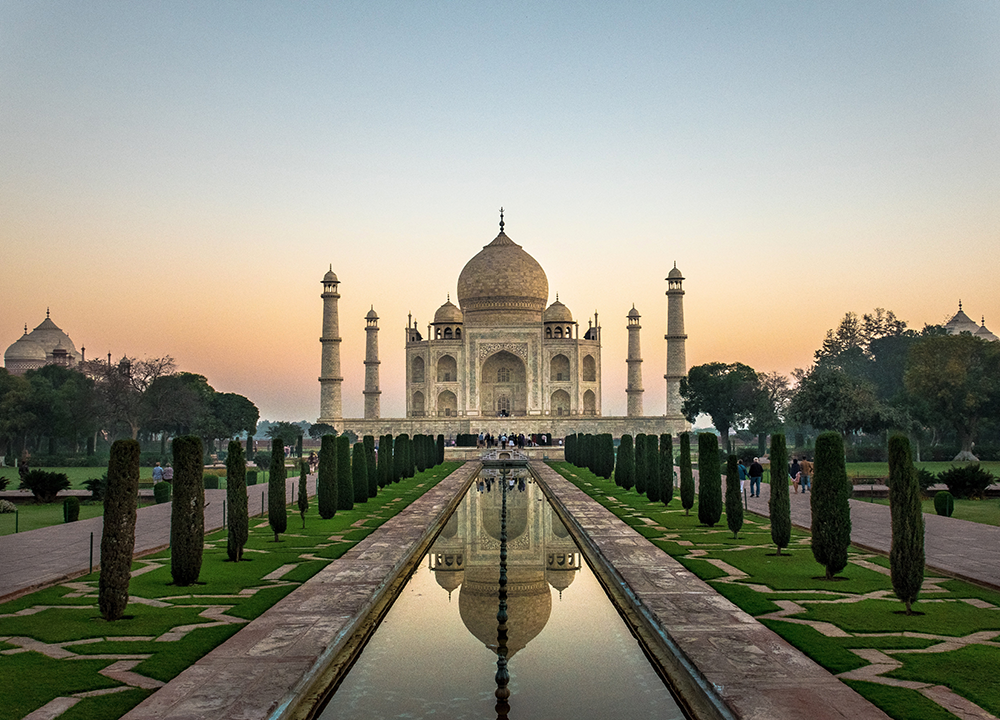Photo Credit: Shan Elahi/Unsplash
I watched the last sunset of 2020 in Agra, the city known to host the beautiful Taj Mahal. If the warm orange sun reflected my fervent wish to welcome a new year, the haze may have been a prescient warning of the months ahead.
The COVID-19 vaccination drive started in India in January 2021, and the daily number of positive cases remained low. With this improved situation, in March for the first time after the pandemic hit the country, I ventured out and took a domestic flight to visit a project site in Western India. At the airport I did not see much adherence to social distancing.
A month later into mid-April, everything suddenly started to reverse at full speed. I felt breathless watching the news of oxygen shortages across the country. The wail of ambulances filled the midnight air. Health facilities and human resources were completely overstretched. Journalists were reporting the reality from overflowing hospitals and devastated communities, risking their own lives. The country was at a full-fledged war, battling COVID-19.
I felt shrouded by the same darkness and uncertainty that descended on us in March 2020, followed by a full lockdown for two months. I remember wondering how I could bring my team together and if we would be able to stand by the people of India in their hour of need. Despite all the unimaginable odds, in 2020 we achieved more than I could have ever imagined.
A year later, therefore, I thought I had become more experienced to cope with the COVID-19 crisis. Yet, it felt harder this time to navigate through the crisis. Unlike last year, this time everybody in the team was affected. In total, about 120 colleagues tested positive between April and May, some of whom were hospitalised. We had to look for oxygen cylinders and available hospital beds for colleagues whose conditions worsened. Many had to take care of their family members or close kin either at home or in a hospital. Many were mourning the loss of their loved ones. We lost two dear colleagues in our UNDP family. This crisis was very personal.
Confronted with this nature of crisis, I kept thinking about my parents and how they coped after the devastating earthquake in Kobe in 1995. How people in Japan rose out of the destruction of World War II. In India, I witnessed the same kind of resilience and strength in people around me.
Thankfully the COVID-19 tsunami receded, and a sense of respite started to spread in early June. When I look back at UNDP’s work for the first half of the year, I see almost no gap in delivering critical support on the ground.
We have established eleven oxygen generation plants in the Northeast region. To support the government, UNDP embarked on a mammoth task of training more than one million personnel on using the Co-WIN software (Winning over COVID). We are helping the most marginalized and vulnerable community with social protection and livelihood opportunities. We are making a difference by imparting digital literacy to the elderly and people with disabilities. We have helped lessen the impacts of climate change and underpin a green recovery from the COVID-19 pandemic. We have made efforts to make COVID-19 response third gender inclusive.
With time to pause and reflect in recent weeks, I gather three lessons from this crisis: the importance of Empathetic Leadership, Self-management, and Peer Support.
Let me explain.
Empathy and kindness are essential to care, support and motivate the team. The following words of Jacinda Ardern, Prime Minister of New Zealand, resonate with me so well. “One of the criticisms I've faced over the years is that I'm not aggressive enough or assertive enough, or maybe somehow, because I'm empathetic, it means I'm weak. I totally rebel against that. I refuse to believe that you cannot be both compassionate and strong.”
Secondly, we will exhaust our stamina if we run this marathon with a sprinter’s speed. According to a quick internal survey among UNDP leadership, only a third of us saw ourselves in the “performance zone” engulfed in wave after wave of COVID-19 outbreaks; the rest saw themselves between “survival”, “burn-out” and “recovery” zones. I felt relieved in a way to know that other colleagues were facing similar challenges. With the help of my new activity tracking ring, which scores my daily sleep, readiness, and activities, gradually, I am adjusting my work life balance these days.
And comes peer support. A special feature of a multilateral organization as large as ours is having a big family – of over 120 peers around the world. During the recent crisis, colleagues from around the world reached out to me, checked on how I was coping, and offered ‘surge’ support (staff deployments in crisis situation) by releasing colleagues from their duty station to join my team virtually. The advice, support and camaraderie offered by my peers have helped me navigate through the crisis.
The year 2021 will soon come to a close. My wish for a better time remains the same as when I saw the sunset in Agra. Having seen the resilience and strength of India and its people, I have less disquietude and feel more optimistic.

 Locations
Locations
